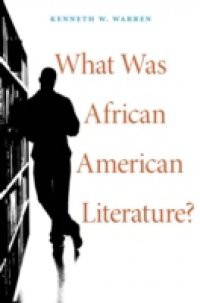Warren argues, quite bluntly, that "African American literature" has outlived its relevance as the dominant category for poetry, fiction, and plays written by African Americans. Contradicting an influential portion of the field, which regards this literature as an emanation of vernacular expression going back to slavery, and even to Africa, Warren asserts that African American literature was the body of literature and criticism written by black Americans within and against the strictures of Jim Crow America. In arguing against the continued relevance of the category of African American literature, Warren is certainly not claiming that racism has ceased to exist. Rather, he says that while it continues to make a great difference in African American life, other social and political factors weigh heavily also - so much so that categories which take race as the fundamental unifying category of black expression no longer serve well in meeting the challenges of the moment. In this respect, Warren shows that "African American literature" is a category that has not sufficiently adjusted with our current material and ideological circumstances to warrant claims to a changing present or a provisional futurity. Warren argues that the presumptions and protocols of the category remain ossified within the past, within a definition that only shows how its primary arbiters and practitioners were themselves ossified as contradictory or compromised men of their time.

